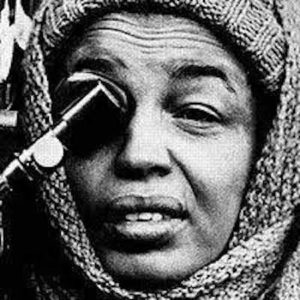
Tressie Souders
*Tressie Souders was born on this date in 1897. She was a Black maid and film director.
Theresa Ann Souders was born in Frankfort, Kansas, the only child of Robert Souders and Leuvenia Ann Bryant, African American natives of Kentucky who emigrated to Kansas, like others from the South to the American West due to the Exoduster movement. The couple split, and on June 9, 1904, Leuvenia married Chester Arthur Harris, a porter for the Missouri Pacific Railroad, with whom she would have six more children.
Souders grew up in Frankfort and graduated from Frankfort High School in 1918. After graduation, she moved to Kansas City, Missouri, where she was employed as a maid in private homes, a job she would perform for most of her life. It is not known how Souders got into the filmmaking business. However, it is known that she acted in an amateur theatrical production, a morality play entitled "Every Negro" written by the Reverend A. Lawrence Kimbrough of the Holsey Chapel Christian Methodist Episcopal Church of Frankfort in 1918. In 1921, she worked as a maid at the Mack B. Nelson House in Kansas City, Missouri.
Kansas City physician A. Porter Davis produced and starred in A Lure of A Woman, created in 1921, while local newspaper editor, author, lecturer, and social activist Maria P. Williams produced, directed, and starred in a 1923 melodrama The Flames of Wrath. Both productions enlisted local talent. In January 1922, the Afro-American Film Exhibitors Company of Kansas City, Missouri, with offices in Baltimore, Maryland, and Dallas, Texas, contracted with Souders to distribute her film "A Woman's Error ."
On January 28, 1922, Billboard Magazine published the company's announcement that" 'A Woman's Error' was the first of its kind to be produced by a young woman of our race and has been passed on by the critics as a picture accurate to Negro life." Thus, she is known as the first known African American female to direct a feature film. To date, no prints have been located.
Sometime between 1923 and 1926, Souders moved to Los Angeles, California, to enter the motion picture business. However, she appears in surviving public records as a domestic worker. In the 1930 Federal Census, as "Tressa Souders," she is listed as a Sojourner Truth Industrial Home resident at 1139 East Adams Avenue. She would stay at that address until 1935, when she married Oscar C. West, a native of Richmond, Virginia, who ran a pool hall in the Watts section of Los Angeles. The marriage was short-lived; by 1940, she was in San Francisco, California, living at the Madame C.J. Walker Home for Girls at 2066 Pine Street. Oscar West died in 1992 in Los Angeles. There were no children.
She remained in San Francisco for the rest of her life, subject to periodic trips to Los Angeles or Kansas. She died on January 17, 1995, just before her ninety-eighth birthday, and is buried with her mother, stepfather, and other family members in the Frankfort Cemetery in Marshall County, Kansas.
The Tressie Souders Film Society grew from the International Black Women's Film Festival (IBWFF), founded in 2001 in San Francisco. According to its website, the Society "recognizes, supports and preserves film and video works by featuring Blacks in non-stereotypical...roles. The society's goals are to provide a voice, resources, support, training, and guidance to emerging and established filmmakers who exemplify the society's mission and the mission of the International Black Women's Film Festival."
In 2008, the IBWFF established the Tressie Souders Awards ("Tressies"), now known as the Black Laurel Awards. The IBWFF has recently initiated the "Tressie Magazine"; its goal is to provide "insightful articles about your favorite Black actresses, including a refreshingly contemporary look at style, music, and the film industry –especially regarding women of color."
To Become an Animator
To Become a Media Producer or Director